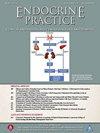围神经侵犯不是甲状腺癌复发和侧颈转移的独立危险因素:倾向评分匹配分析。
IF 4.6
3区 医学
Q2 ENDOCRINOLOGY & METABOLISM
引用次数: 0
摘要
目的:甲状腺癌的神经周围浸润(PNI)是一种相对罕见但重要的病理特征,对预后和治疗具有重要意义。本研究探讨PNI对甲状腺癌患者复发及侧颈淋巴结转移(N1b)的影响。方法:本回顾性分析包括2000年1月至2020年12月在首尔圣玛丽医院接受手术的8,572例甲状腺癌患者。比较倾向评分匹配(PSM)前后PNI患者和非PNI患者的临床病理特征和结局。逻辑回归分析确定了N1b的危险因素,而Cox回归分析确定了复发的危险因素。结果:8572例患者中,144例(1.7%)出现PNI。PNI组甲状腺外展、血管和淋巴浸润及TNM晚期发生率较高。PNI组的复发率在PSM前(11.1%比5.6%)和PSM后(11.3%比5.6%)均较高。在单因素logistic回归分析中,PNI是N1b的显著危险因素,但在PSM前后的多因素分析中,PNI不是N1b的显著危险因素。Cox回归分析显示PNI是PSM前复发的重要危险因素,而不是PSM后复发的重要危险因素。结论:甲状腺癌的PNI与较高的复发率和N1b升高有关。然而,它不被认为是复发或N1b的重要独立危险因素。需要进一步的研究来完善PNI患者的管理策略以改善预后。本文章由计算机程序翻译,如有差异,请以英文原文为准。
Perineural Invasion Is Not an Independent Risk Factor for Recurrence and Lateral Neck Metastasis in Thyroid Cancer: A Propensity Score Matching Analysis
Objectives
Perineural invasion (PNI) in thyroid cancer is a relatively rare but significant pathologic feature with crucial implications for prognosis and management. This study investigates the impact of PNI on recurrence and lateral neck lymph node metastasis (N1b) in patients with thyroid cancer.
Methods
This retrospective analysis included 8572 patients with thyroid cancer who underwent surgery from January 2000 to December 2020 at Seoul St. Mary’s Hospital. Clinicopathologic characteristics and outcomes were compared between the patients with and without PNI before and after propensity score matching (PSM). The logistic regression analysis identified the risk factors for N1b, whereas the Cox regression analysis determined the risk factors for recurrence.
Results
Of the 8572 patients, 144 (1.7%) presented with PNI. The PNI group had higher rates of gross extrathyroidal extension, vascular and lymphatic invasion, and advanced TNM stage. The recurrence rates were higher in the PNI group both before (11.1% vs 5.6%) and after PSM (11.3% vs 5.6%). PNI was a significant risk factor for N1b in the univariate logistic regression analysis but not in the multivariate analysis before and after PSM. The Cox regression analysis revealed that PNI is a significant risk factor for recurrence before PSM but not after PSM.
Conclusions
The PNI in thyroid cancer was associated with higher recurrence rates and increased N1b. However, it was not considered a significant independent risk factor for recurrence or N1b. Further research is needed to refine the management strategies for patients with PNI to improve prognosis.
求助全文
通过发布文献求助,成功后即可免费获取论文全文。
去求助
来源期刊

Endocrine Practice
ENDOCRINOLOGY & METABOLISM-
CiteScore
7.60
自引率
2.40%
发文量
546
审稿时长
41 days
期刊介绍:
Endocrine Practice (ISSN: 1530-891X), a peer-reviewed journal published twelve times a year, is the official journal of the American Association of Clinical Endocrinologists (AACE). The primary mission of Endocrine Practice is to enhance the health care of patients with endocrine diseases through continuing education of practicing endocrinologists.
 求助内容:
求助内容: 应助结果提醒方式:
应助结果提醒方式:


